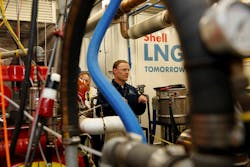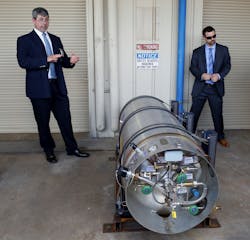Natural gas trucks: Coming soon from China?
SAN ANTONIO. The fall in the price of diesel may have taken the shine off of alternative fuels in U.S. trucking for the time being, but liquefied natural gas (LNG) is already used in a significant and rapidly growing number of highway trucks in China. And the technologies developed there and produced at scale are likely to gain a foothold in the North American market in the near future, Shell representatives explained in global media event at the Southwest Research Institute (SwRI) .
Simply, for Shell, an expected doubling in energy demand in the next 50 years poses “an incredible challenge,” and natural gas “is going to be a big part of that story,” says Colin Abraham, president, Shell Lubricants Americas.
Of course, Shell has been extracting gas for 50 years and owns processing facilities around the globe. Increasingly, the energy giant is investing in smaller, near-to-market LNG production facilities as well as LNG retail networks.
The bottom line for transportation is that there will be good business case for LNG for a long time to come, and Shell plans “to drive adoption, particularly in trucking and shipping,” Abraham said.
The advantages to LNG, along with its availability and affordability, are that the liquid form of the gas is energy dense and transportable, and that as methane, it’s the cleanest burning hydrocarbon and therefore will be more environmentally acceptable, explains Scott Hartman, downstream LNG application specialist for Shell.
Compared to CNG, which is commonly moved through pipeline networks and requires additives for transport safety, LNG is much more pure. And that means fewer engine deposits.
While CNG still makes sense in many applications, LNG is very good fuel for long-haul trucking, Hartman says.
The proving ground for LNG trucks is China, where there are more than 330,000 medium- and heavy-duty trucks on the road, according to Shell—and that number is expected to triple in the next five years . That compares to about 23,000 in the U.S. and only 2,000 in Europe.
Still, Shell has equipped a “Center of Excellence” in the truck engine testing facilities at SwRI where LNG engines are put through their paces and appropriate lubricant formulations are evaluated. The effort is all the more critical because there are no standards specifically for lubricants used in natural gas engines, so Shell has had to develop its own battery of tests.
“Customers like to see the evidence before they make that investment in natural gas,” Hartman said. “We’re starting to realize some real tangible benefits from setting up these tests.”
And even though the demand isn’t here yet, the market could get a boost with competition from some new players.
“There are Chinese engines on the way which will meet EPA standards in the U.S. market in the next couple of years,” Abraham told Fleet Owner in a follow-up interview.
Hartman anticipates these will be 13-liter, high-pressure, direct-injection engines—and, because of the scale of production already in place there, the costs likely will be more affordable.
“All the [North American] OEMs offer natural gas trucks, but they all use the Cummins Westport engines. What we really would like is a lot more diversity in that space,” Hartman said. “It's business: If you create competition, people are going to have to react.”
Of course, trucks need service networks, so the most likely model would be a licensing deal with North American truck makers, they suggest.
Indeed, also at the research center was a Chinese-made LNG fuel tank which was undergoing durability testing. And passing. It’s a project with OEM partners that Hartman declined to name.
“We want them to understand that we believe in it, we’ve tested it,” he said. “And they’ve given us fair indication that if Shell supports these technologies they would be happier to take those onto their trucks.”
“I think we’re looking, potentially, at a 60 percent drop for the cost of the fuel tank,” Abraham added.
Additionally, Shell and GE Capital have recently signed a commercial agreement with a view to spurring the trucking industry's adoption of LNG in Canada—a deal that, if successful, would likely expand to the U.S. as well.
Under the agreement, GE Capital and Shell will work together to reduce monthly payments for truck fleets that lease natural gas vehicles. Specifically, fleets owners can sign natural gas fueling contracts with Shell and, separately, secure leases for LNG vehicles with GE Capital. The agreement covers equipment that will purchase fuel from Shell's facilities.
“It’s about the risk of having no secondary market at this point, and the fleets are looking for someone to cover them for that,” Hartman said. “What it says is how much Shell believes in that market.”
Indeed, just this week Abraham had signed deals to supply LNG trucks for two big fleets, he added. And Shell continues to roll out retail locations, with 5 to 10 more stations coming in the next year.
“We’re in the market. We’re keeping in front of customers. It’s sort of like a test market, but we’re going to stay with it,” Abraham said. “Even at lower oil prices, there’s still a differential. Depending on the environmental considerations the customer might have, depending on the type of business—and if we can get the price of a new LNG truck down—the economics is there.”
About the Author
Kevin Jones 1
Editor
Kevin has served as editor-in-chief of Trailer/Body Builders magazine since 2017—just the third editor in the magazine’s 60 years. He is also editorial director for Endeavor Business Media’s Commercial Vehicle group, which includes FleetOwner, Bulk Transporter, Refrigerated Transporter, American Trucker, and Fleet Maintenance magazines and websites.


